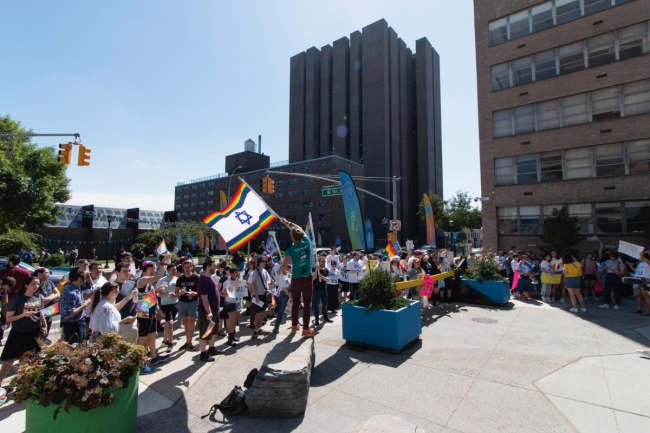You have /5 articles left.
Sign up for a free account or log in.

Yeshiva University students held a rally for LGBTQ+ students in 2019.
Leo Skier
A group of students filed suit Monday against Yeshiva University in an attempt to compel the Jewish institution in New York City to recognize an LGBTQ+ student club.
The lawsuit argues that because Yeshiva is legally registered as a nonsectarian corporation, it cannot discriminate under the New York City Human Rights Law.
“This is a straight-forward case under the very clear law of New York City, which has one of the strongest civil rights laws in the country,” Katherine Rosenfeld, the lead lawyer representing the students, said during a press conference Tuesday morning.
“Undergraduate students at Yeshiva University would like to form an LGBTQ student group to provide peer support, community, host events, coffees, all the activities that student clubs exist to provide and which are so important to the development and success of college students,” Rosenfeld said. “Unfortunately Yeshiva University has repeatedly refused to recognize the LGBTQ student group because it is for LGBTQ students and about LGBTQ issues in its mission. This is discrimination under New York City human rights law, plain and simple.”
Yeshiva previously justified its decision not to recognize the club in fall 2020 in religious terms.
“The message of Torah on this issue is nuanced, both accepting each individual with love and affirming its timeless prescriptions,” Yeshiva administrators said in a September 2020 statement quoted in the lawsuit. “While students will of course socialize in gatherings they see fit, forming a new club as requested under the auspices of YU will cloud this nuanced message.”
The September 2020 statement does not specify which prescriptions of the Torah were relevant to its decision about the LGBTQ+ student alliance. Yeshiva said in a statement Tuesday in response to the lawsuit that "love for God and love for each of His children" lies "at the heart of our Jewish values."
"Our LGBTQ+ students are our sons and daughters, brothers and sisters, family and friends," the university statement says. "Our policies on harassment and discrimination against students on the basis of protected classifications including LGBTQ+ are strong and vigorously enforced. Our Torah-guided decision about this club in no way minimizes the care and sensitivity that we have for each of our students, nor the numerous steps the university has already taken. We are actively engaged with our students, faculty and rabbinic leaders to facilitate productive discussions with an eye toward understanding and embracing diverse perspectives."
The lawsuit against Yeshiva comes at a time when religious colleges’ policies regarding LGBTQ+ students are increasingly under scrutiny. About 30 former and current LGBTQ+ students who enrolled in various evangelical Christian colleges sued the Department of Education last month, accusing the department of failing to protect them from discriminatory anti-LGBTQ+ policies at the colleges and challenging the constitutionality of a religious exemption to a federal antidiscrimination law.
According to the lawsuit against Yeshiva, which was filed in New York state court, the university's decision to deny recognition to various proposed LGBTQ+ student groups can be traced back to 2009. The university has refused to recognize LGBTQ+ student groups on three occasions in 2019 and 2020.
Despite the ongoing refusal to recognize the organization, the lawsuit claims that Yeshiva was advised by its lawyers more than 25 years ago that it has “no credible legal argument” to ban a LGBTQ+ student group -- a legal conclusion that the plaintiffs argue “is as correct today as it was in 1995.”
“There’s no exemption that shields its conduct,” Rosenfeld, the students’ lawyer, said of Yeshiva. “It operates on paper and legally with all the benefits of nonsectarian status, and now it must operate that way in reality by treating its students equally.”
Fifty-one law professors at Yeshiva signed a letter sent Tuesday to the university president, Rabbi Ari Berman, urging the university to recognize the club for both moral and legal reasons and expressing their “dismay” at the university’s refusal to do so.
The law professors wrote that “the continued refusal to recognize the student organization is hurtful to our students and other community members and will seriously damage the reputation of the University’s graduate and undergraduate programs. It is also wrong and unlawful.”
Edward Stein, a professor of law at Yeshiva who helped organize the letter, said the “vast majority” of the law school’s full-time faculty signed the letter. “We’ve been advocating within the school on behalf of the recognition of the student group for quite a long time,” he said.
“I am hopeful,” Stein said. “I think that the university will do the right thing and both follow the law and follow what it should do ethically and what’s educationally best for our students.”
Molly Meisels, a former Yeshiva student who is part of the group of students who filed the suit, described the lawsuit as “a last resort for students, for alumni.”
“For years we’ve gathered together, we’ve marched, we’ve met behind closed doors with the administration, with faculty, with staff, just hoping, praying and begging for a queer student group to be recognized,” she said. “Time and again, our efforts have been snubbed, we've been rejected, and with every rejection we as students felt rejected. This lawsuit became the only possible means for us to protect current students at the university and future students at the university.”








